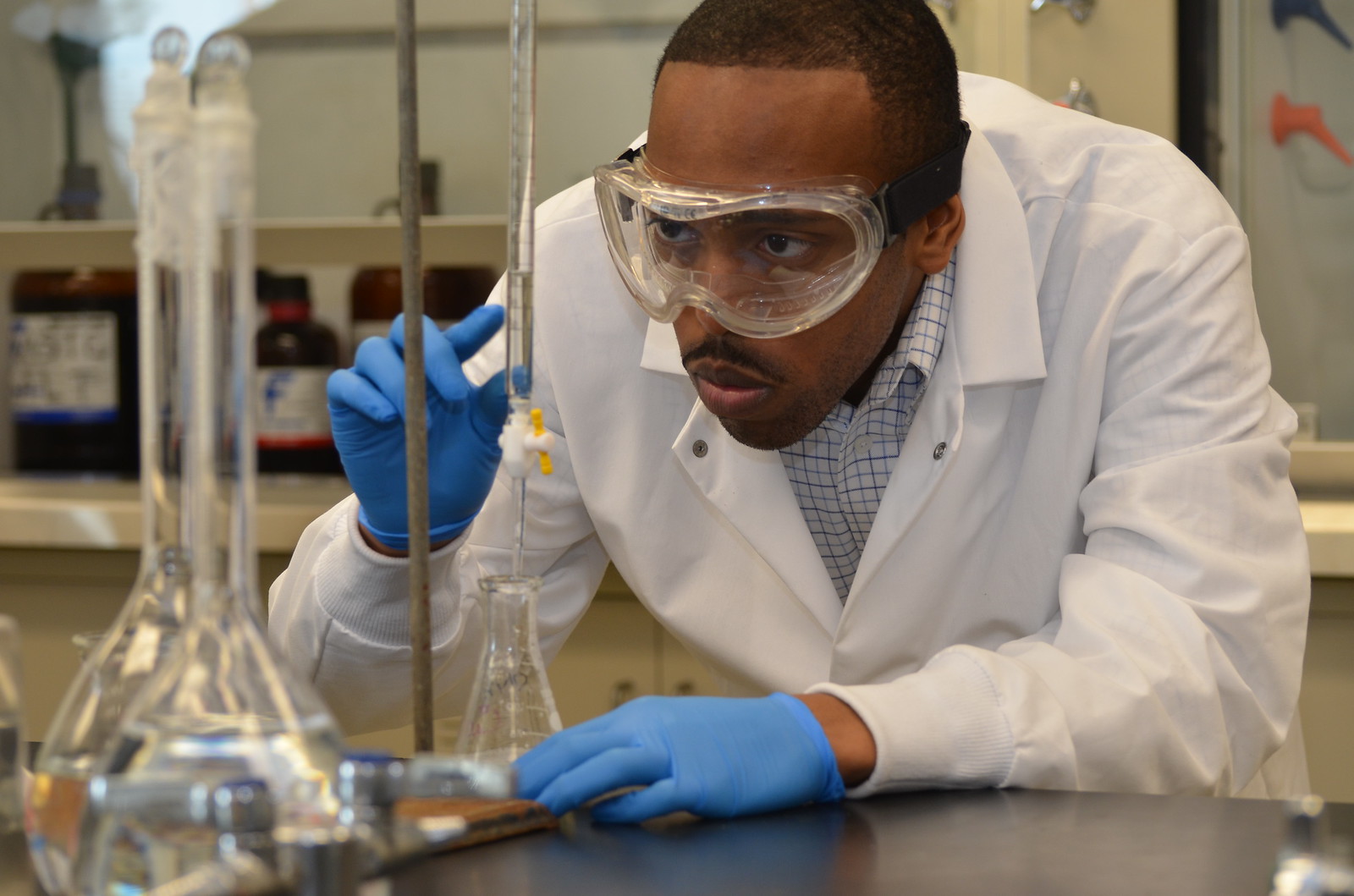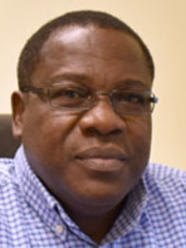Study Life's Complexity
In concert with the mission of the University, Chemistry faculty foster the professional development of students through academic excellence, and provide educational opportunities to students to be competitive in a technological society.
-
Opportunities exist for undergraduate research experience, both on campus and through summer internships.
-
All faculty hold PhDs and bring real-word experience to the classroom.
-
All students benefit from small-class settings and one-on-one mentoring from professors.
Program map
-
- Meet with USSC Advisor
- Begin General Education Requirements
- Begin Math Requirements
- Complete General Biology Courses
- Complete General Chemistry Requirements
- Join college club(s)
- Meet faculty & staff in CESTA
-
- Meet with Major co-Advisor
- Complete Physics Courses
- Complete Writing Requirements
- Begin Chemistry Core Classes
- Complete Math Requirements
- Explore undergraduate research/internships
- Explore adding a minor/certificate
-
- Get Assigned to Major Advisor
- Conduct 90 Credit Degree Audit with Advisor
- Complete core Chemistry Courses
- Begin Minor/Certificate requirements
- Begin Chemistry Electives
- Explore undergraduate research/internships
- Take Professional Exams (e.g., MCAT, GRE)
- Apply to graduate or professional schools
-
- Complete Minor/Certificate courses
- Complete Elective Courses
- Complete CHM 4895-96 (Undergraduate Research)
- Apply to Graduate/Professional programs
- Acceptance into Graduate or Professional Program
- Graduate
-
Year 4+
- Degree Awarded
- Post graduate surveys
- Begin your post-CSU Experience
Chemistry Course Descriptions
-
CHM 1050. Chemical Concepts (I, II; 3)
This course covers some of the basic mathematical skills needed for success in chemistry courses as well as introducing basic concepts of chemistry. The course is designed to help students who have not had high school chemistry or who wish to review before beginning the General Chemistry sequence. Three one hour lecture/discussion sessions per week.
CHM 1150. Elements of Chemistry (I, II; 4)This course is intended to meet the needs of students’ general education core who are not majoring in a science area. This course will show the relevance of chemistry to socially important problems, and in the process introduce concepts such as chemical bonding, stoichiometry, and acid/base equilibria. Three one-hour lectures and one two-hour inquiry-based laboratory per week.
CHM 1201. General Chemistry I (I, II; 4)This course begins a sequence which supplies a foundation in chemistry for science majors. Topics covered include atomic structure, bonding, stoichiometry, thermo chemistry, periodic law, gas laws, and solutions. Three one-hour lectures and one three-hour lab per week. Pre- or co-requisite: MTH 1750 or the equivalent.
CHM 1202. General Chemistry II (I, II; 4)This course completes the sequence begun in CHM 1201. Topics covered include kinetics, equilibria, pH, solubility, thermodynamics, and electrochemistry. Three one-hour lectures and one three-hour lab per week. Prerequisite: CHM 1201.
CHM 1610. Introduction to Forensic Science I with Lab (I, II; 4)This course is intended to meet the needs of students’ general education core. This course will provide a foundation for the different aspects of science used to solve crimes and most important enforce justice in our society. Some of the topics covered are: 1. Processing the crime scene, 2. Hair, fibers and paints analysis, 3. Drugs control and identification, 4. Forensic toxicology, 5. Aspects of arson and explosions, 6. Forensic serology, 7. Forensic anthropology, 8. Fingerprints, 9. Firearms and tool marks, 10. DNA. There are three hours of lecture and two-hour lab period each week. Laboratory exercises will be selected to reinforce the materials covered during lecture. Prerequisites: High School math, chemistry.
CHM 2200. Quantitative Analysis (II; 4)This course is a study of the theory and practice of classical methods of chemical analysis. Gravimetric analysis and volumetric techniques based on acid/base, precipitation, complexation, and oxidation/reduction reactions will be covered. Three one-hour lecture/discussion sessions and one four-hour laboratory per week. Prerequisite: CHM 1202.
CHM 2401. Organic Chemistry I (I; 4)This course begins a two-semester sequence dealing with the chemistry of carbon compounds. The course begins with a discussion of the structure and reactivity of covalent compounds, including acid-base properties, kinetics, and stereochemistry. The course then begins a systematic discussion of the various organic functional groups and their reactions. Three one-hour lectures and one four-hour lab per week. Prerequisite: CHM 1202.
CHM 2402. Organic Chemistry II (II; 4)This course continues the sequence begun in CHM 2401. The systematic discussion of functional groups is continued along with some coverage of the synthesis of organic compounds and spectroscopic identification of them. Three one-hour lectures and one four-hour lab per week. Prerequisite: CHM 2401.
CHM 2600. Introduction to Forensic Science (II: 4)This course will provide a foundation for the different aspects of science used to solve crimes and enforce justice in our society. Some of the topics covered are: Organic analysis & Inorganic analysis, drugs, control and Identification Forensic Toxicology; Techniques and the significance of toxicological findings, forensic aspects of arson and explosion investigation, forensic serology, forensic anthropology, DNA, the future forensic tool. There are three hours of lecture and a two-hour lab period each week. Laboratory exercises will be selected to reinforce the materials covered during lecture. Prerequisites: CHM 1610 and CHM 1201 or CHM 1202.
CHM 3050. Chemistry Seminar (II; 1)This course is designed to introduce chemistry majors to recent advancements in sciences, as well as current and ongoing research carried in this field. This course will also help all majors to carry out the required undergraduate research as well as enhancing their chances for better careers in their field or future graduate studies. Presentations will be made by faculty and guest speakers. Required for all chemistry majors. Prerequisite: Junior standing.
CHM 3501. Physical Chemistry I (I; 3)This course is an introduction to the laws of classical thermodynamics and their applications to systems at equilibrium. Three one-hour lecture/discussion sessions per week. Prerequisites: CHM 1202 and PHY 2213/2214.
CHM 3502. Physical Chemistry II (II; 4)A continuation of the study of thermodynamics and equilibrium followed by a study of electrochemistry, kinetics, and an introduction to crystal structures. The laboratory portion of the course emphasizes the measurement of the physical and thermodynamic properties of organic and inorganic compounds. Three one-hour lecture/discussion sessions and one four-hour laboratory per week. Prerequisite: CHM 3501.
CHM 3600. Introduction to Radiochemistry (I; 4)This course and its corresponding laboratory will cover nuclear theory, concepts and calculations, control, handling and use of radioactive materials, fundamentals, principles of radiochemistry, separation chemistry concepts, principles of Alpha and Gamma spectrometry as well as principles of liquid scintillation counting and mass spectrometry. Three hours of lecture and one three hour lab. Prerequisites: CHM 1202; PHY 2211/2212.
CHM 3797. Selected Topics in Chemistry (On demand; 3)This course is designed to provide greater coverage topics that do not normally get in-depth coverage in other courses and to present new concepts in chemistry. Topics to be covered may come from any area of chemistry and will be selected on the basis of student and faculty interest. The intent of this course is to provide an opportunity for students to become familiar with an area or areas of current research interest. May be repeated for credit. Prerequisite: Permission of the instructor.
CHM 4100. Advanced Inorganic Chemistry (I; 4 – Odd Years)This course is designed to introduce the theories underlying modern inorganic chemistry. Atomic structure, ionic and covalent bonding, and acid/base behavior are emphasized. Group theory, valence bond, molecular orbital, crystal field, and ligand field bonding models will be employed. Laboratory experiments will illustrate the synthesis and properties of inorganic materials. Three one-hour lectures and a three-hour laboratory each week. Prerequisite: CHM 3502.
CHM 4200. Instrumental Analysis (I; 4 - Even Years)This course deals with modern instrumental methods of chemical analysis. The principles of the design and construction of various types of spectrometers, chromatographs, and electro analytical instruments will be discussed with emphasis on the advantages and limitations of these methods. Laboratories will involve application of these principles. Three one-hour lecture/discussion sessions and one three-hour laboratory per week. Prerequisites: CHM 2200 and CHM 3502.
CHM 4300. Biochemistry (I; 4)This course involves the study of the properties of carbohydrates, proteins, lipids, nucleic acids, and the reactions they undergo. Experimental work will introduce the chemical and physical properties of selected biological molecules. Three one-hour lecture/ discussion sessions and one four-hour laboratory per week. Prerequisites: CHM 2402 and BIO 1801.
CHM 4400. Advanced Organic Chemistry (II; 3 – Even Years)This course uses concepts of kinetics and thermodynamics learned in Physical Chemistry to explain the properties and reactions of organic compounds. Three one-hour lecture/discussion sessions per week. Prerequisites: CHM 2402 and CHM 3502.
CHM 4500. Quantum Chemistry (II; 3 - Odd Years)This course is an introduction to quantum theory and atomic spectra. Three one-hour lecture/discussion sessions per week. Prerequisites: CHM 3502 and MTH 3110.
CHM 4600. Advanced Forensic Science (II; 4)This course will provide information for the different aspects of science used to solve crimes and enforce justice in our society. Some of the topics covered are: organic and inorganic analysis, drugs, control and identification, forensic toxicology, techniques and the significance of toxicological findings, forensic aspects of arson and explosion investigation, forensic serology, forensic anthropology, and DNA, the future forensic tool. There are three hours of lecture and a three-hour lab period each week. Laboratory exercises will be selected to reinforce the materials covered during the lecture. Prerequisites: CHM 2600, 2200 and 4300.
CHM 4791. Undergraduate Research I (I, II; 2)This course offers the opportunity for an advanced chemistry major student to do independent research on a problem. Eight hours of laboratory and or library effort per week. Prerequisite: Approval of the department.
CHM 4792. Undergraduate Research II (I, II; 2)This course offers the opportunity for an advanced chemistry major student to expand his/her independent research on a problem. Eight hours of laboratory and/or library effort per week. A presentation and/or poster are required to be submitted by all students as part of this course requirements and completion. Prerequisite: CHM 4791.
CHM 4895. Integrated Concepts of Chemistry (II; 3)This course uses several case study problems to apply and reinforce concepts learned in previous chemistry courses. Three one-hour discussion sessions per week. Prerequisite: 25 hours of chemistry courses.

Career Paths
A Central State chemistry degree prepares you to work in all levels of dental, medical, pharmacy and veterinary schools, physical sciences teaching, or forensic science to name a few. You’ll fulfill professional requirements while getting a solid grounding in the basics as well as extensive research experience. And you’ll explore the many career paths available to you in the Chemistry field.
-
Health and medicine
-
Graduate studies in physical sciences
-
Physical sciences teaching
-
Forensics

Just like a single cell, the character of our lives is determined not by our genes but by our responses to the environmental signals that propel life.
Ibrahim Katampe, Ph.D.
Experiences and Opportunities
Learning doesn’t stop when class ends. Opportunities to increase your knowledge and expand your network include hands-on research for all students, top speakers and CSU’s chapter of the national biology honors society.
-
At CSU, even undergraduate chemistry majors do research, whether it’s at the campus lab or off-campus at an internship. You’ll work with professors and research scientists, and some students present and publish nationally.
-
You’ll hear about research, the bedrock of the field from guest speakers throughout the year. And you’ll begin to imagine the career paths you can take with your degree and the impact you’ll be able to have.
-
Students who qualify for induction have access to national speakers and networks in the discipline.
Explore More Programs
Ohio’s only Sustainable Agricultural major will equip you to help address the resource needs brought by climate change.
You’ll gain invaluable hands-on experience teaching in Dayton or Xenia public schools as you prepare for certification.
Thanks to our vocational approach, you’ll graduate ready for certification and employment in growing fields like training, coaching, rehabilitation and exercise physiology.